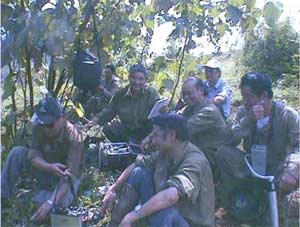According to information from the Federation of Geological and Rare Earths, there are currently several areas with natural radiation in Vietnam where many people reside. The danger is that these regions have radiation levels significantly higher than the permissible environmental standards.
 |
|
Survey at Dong Pao mine, Lai Chau |
In an interview with a reporter on June 30, Mr. Tran Binh Trong, Deputy Head of the Technical Department of the Federation, stated that some areas with natural radiation, such as Tien An commune (Tien Phuoc district, Quang Nam), have many residents living there. Notably, the locals use wells containing graphite ore that includes uranium.
Additionally, there are rare earth areas such as Nam Xe (Lai Chau), Binh Duong (Cao Bang), Southeast Ben Giang (Quang Nam), and the rare earth mine in Muong Hum (Bat Xat district, Lao Cai). In Muong Hum, residents use soil containing radioactive elements to build their houses.
According to Mr. Trong, the accumulation of radiation energy in these regions typically ranges from 2-4mSV per year. Meanwhile, according to Vietnamese environmental standards, if the annual accumulation of radiation energy exceeds 1mSV, it is considered unsafe for the population.
It is known that these mentioned areas are adjacent to radioactive mines and sites containing radioactivity. The radioactive mines and sites have been designated and protected.
Mr. Trong also mentioned that when radioactive elements have the opportunity to disperse into water, plants, and air, they enter the body through breathing and consumption, leading to hazardous exposure doses. In other words, radioactive elements decay in the body, destroying or altering cell tissues, resulting in cancer, genetic mutations, birth defects, or abnormalities in the children of those exposed to radiation. External exposure (radiation from outside the environment penetrating the body) can cause diseases such as leukemia.
Regarding this issue, VietNamNet reporters attempted to contact Mr. Ngo Dang Nhan, Director of the Department of Radiation Safety and Control, via mobile phone on the afternoon and evening of July 2, but he did not answer.
Minh Son


















































